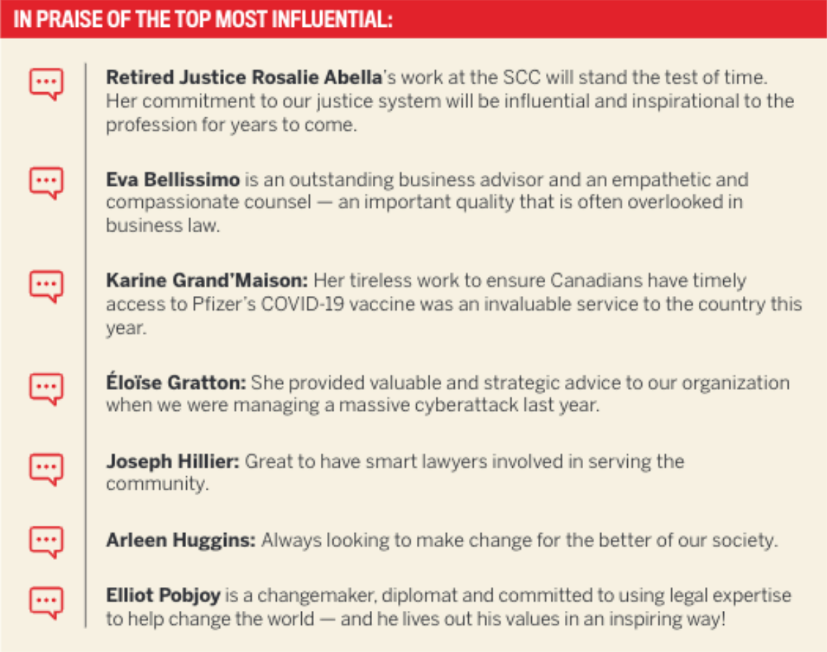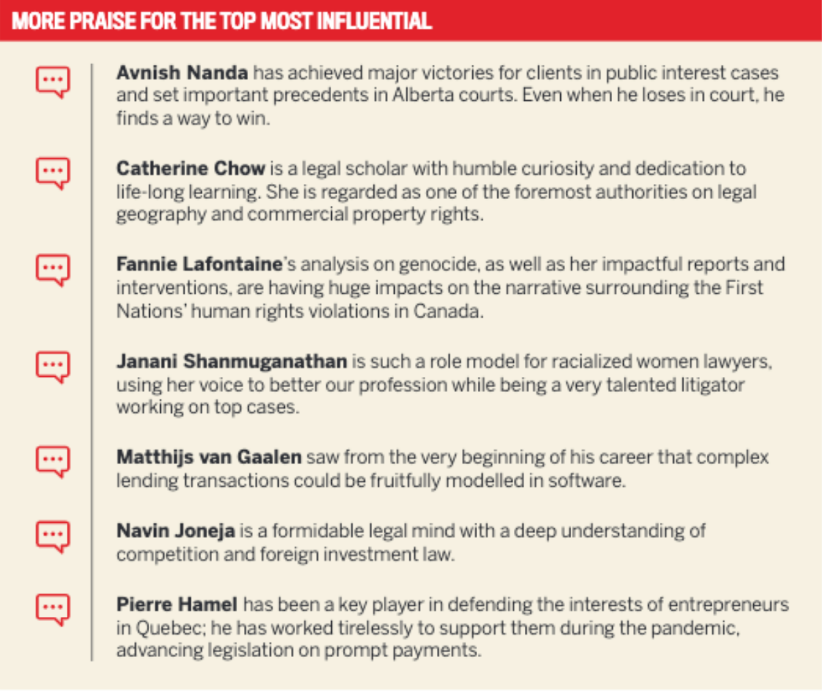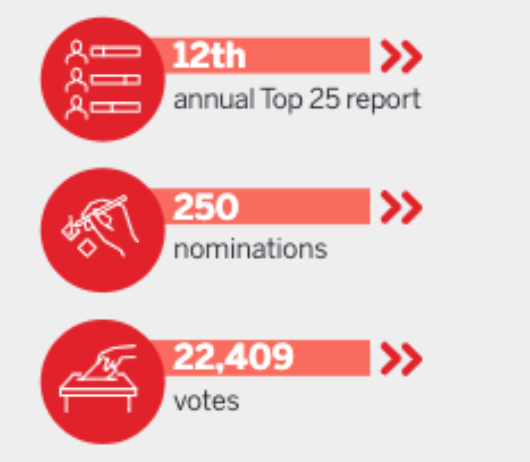

Jump to winners | Jump to methodology
Being named one of Canadian Lawyer’s Top 25 Most Influential Lawyers highlights the critical and considerable work jurists have done in the last 18 months. This year, that’s a noteworthy timeframe, as it reflects how long the world has been deeply immersed in the COVID-19 pandemic. The Top 25 is split into five areas of influence with five winners in each of the following categories: Business; In House; Changemakers; Human Rights, Advocacy and Criminal; and Government/Non-profits/ Associations. Nominees were put in the category in which the individual most recently exercised their influence, which might differ from their primary practice area.
Inclusion in the Top 25 is not a recognition of lifetime achievement. It’s all about the recent ability to influence public opinion and to help shape the laws of this country and others, contribute to the strength and quality of legal services, involvement and impact within the justice community, and social and political influence and involvement.
One very positive feature of this year’s list, as has happened for the last several years: Canadian Lawyer did not make editorial choices to shift the composition of our winners to make the list more diverse and inclusive. It speaks to the strides the Canadian legal profession has made in this regard and that our readers cast their votes to reflect that diversity.
Excelling at their practice while serving the wider community
Virtually all of those named as Top 25 Most Influential this year managed to combine a tremendous workload at their “day jobs” while giving back in full force to the legal and broader community.
Élisabeth Brousseau, for example, is a partner at McCarthy Tétrault in Montreal, focussing mainly on civil, commercial and contract litigation, class actions, consumer protection, and professional and medical liability. The openly gay litigator is also a passionate advocate for gay rights. She is a founding member of the Quebec bar’s LGBT committee, providing an expert opinion on the impacts of proposed federal and provincial legislation, including recent advice on family law reforms to the Quebec Civil Code and penal and criminal laws.

Mindful of mental health for the legal profession
Maneesha Gupta is a highly regarded intellectual property and technology lawyer at TD Bank in Toronto in her working hours. When she’s not working at her job, she turns to her passion of finding ways to help those in the legal profession manage mental health.
“Early on in my career, I saw that a lot of things were broken in the way lawyers talked about self-care and mental health,” she says. “I had spent hours looking for an easy-to-access group of lawyers seeking wellness, personal development, and peer-to-peer solutions.”
The result was creating Mindful Lawyer Canada, a mental health-focused start-up that aims to drive innovation in the personal development space. Her goal is to create a positive peer-to-peer community meditation space for lawyers and others in the legal profession. “The pandemic has taught us that we need connection and community in our lives now more than ever,” Gupta says.
Advocating for protection of children, helping the needy
Another example of the ability of our Top 25 Most Influential winners to follow through on their strong passions inside and outside the law office is Imran Kamal. He has been legal counsel at the Catholic Children’s Aid Society of Hamilton since 2014. Kamal is the only child protection lawyer in Ontario designated as a certified specialist of indigenous legal issues by the Law Society of Ontario.
One of the biggest challenges, he says, is budget and funding cuts and “limited access to resources to be able to better serve the community.”
Yet Kamal has established a volunteer group, Hamilton Lawyers Feed the Hungry, to serve up healthy meals to 100 children and youth and is a volunteer at a Men’s Live-in Addiction Treatment Centre, providing support and resources for men overcoming alcohol and drug addiction. “There are no points of demarcation. I work in all areas of my life to make the world a better place than when I got here.”

Finding affordable housing solutions, fighting for diversity and inclusion
Chinelo Meg Egbunonu is another Top Most Influential winner who manages to pack her day with meaningful work and volunteer activities. She is finance transactions counsel at the Canada Mortgage and Housing Corporation, where she advises on deal structuring towards providing afford-able housing solutions for Canadians. Outside of work, she supports women’s empowerment in society, volunteers with organizations to promote the advancement of Black lawyers (especially women), and advocates through her blog on societal issues such as workplace bias and racism.
As a foreign-trained Black female lawyer and first-generation immigrant, Egbunonu says she found it “pretty challenging” getting into the legal practice community in Canada. One problem was the “inadequacy of networks for lawyers like me, and the existence of prejudices regarding the non-Canadian legal experience of foreign-trained lawyers.” She aims to show that “the experience a lot of us foreign-trained lawyers bring into Canada is not just transferable, but actually valuable.”
Advocating for those with disabilities
Human rights lawyer Lorin MacDonald has expanded inclusion for Canadians at the same time as being a driving force behind HearVue, a social enterprise to increase captioning at large live events.
Living with a profound hearing loss, MacDonald’s efforts with HearVue have allowed a visible means of receiving spoken words, which supports those with hearing loss, learning disabilities, English as a second language and aids understanding of those with unfamiliar speech patterns. It also supports attendees who may miss information because of poor acoustics in the venue.
MacDonald also looks at the law through a disability lens. One of her cases with the Human Rights Tribunal of Ontario, Butler-Henderson v. Pentagram Bar & Grill, led to a decision that serves as a strong reminder to all restaurant owners about the importance of accessibility for those with disabilities. Restaurant staff denied her client entry to their basement washroom out of concern over being sued, claiming that her forearm crutches were a liability should she fall down the stairs.
HRTO affirmed that this was discriminatory and a denial of a basic human right, and the decision has been hailed as a landmark victory for disability rights.
Pushing the boundaries of academic legal research
Sara Gwendolyn Ross, professor at Schulich School of Law at Dalhousie University, is considered one of the leading “urban legal anthropology” scholars. She says her studies seek “to reach under existing legal frameworks to engage with the lived realities of how ‘the law’ shapes the everyday and ‘everynight’ realities of urban denizens.”
Ross talks about the “third places” in our lives outside of work and home. “Music culture and spaces are one example of where intangible cultural heritage is generated by various communities, but their ongoing sustainability is shaped by the urban legal frameworks that govern the use, operation and presence of these kinds of venues within a city.”
Helping young lawyers find fulfillment
Aaron Baer launched 4L Academy to “completely re-think how training for law students and lawyers should work.” Much of this comes from his own experience. “I was completely unprepared for how to be a lawyer. Unfortunately, neither law school nor my formal in-firm training got me to where I needed to be. The result was impostor syndrome and anxiety.”
4L partners with teaching experts and has brought in passionate young lawyers as instructors who work with a custom-built curriculum. “We’ve proven that you can run interactive, engaging, and incredibly effective legal training in a remote environment.”
Baer says the feedback has been phenomenal. “We’re a supplement to law school and law firm training, and we’ve had students and lawyers from more than two dozen firms join our courses so far.” Many law firms are really struggling to understand their younger members, he says, and are trying to adapt to a rapidly changing world.
Only 25 of the amazing nominees can make the final list, yet all who were nominated have impacted the legal profession. To all of the winners and the nominees, Canadian Lawyer extends a hearty congratulations.
Now in its 12th year, Canadian Lawyer starts the Top 25 Most Influential Lawyers by calling for nominations to legal groups and associations representing a variety of memberships and regions, our readership and our internal panel of writers and editors. From 246 nominations this year, our editorial staff removed or added names to reflect our primary goal — finding lawyers or judges who have made a mark on the legal system over the last 18 months. This year, that “long list” included 177 names.
Once we have the long list, we post it online and ask our readers for their votes. This year we received a total of 22,409 votes, along with comments on who they felt had an impact. We also added a twist to get to the final 25 — we asked for input from our newly constituted Editorial Board. Members of the board, who include legal leaders across Canada, were encouraged to weigh in on candidates in their area of law who received the most votes. The last word on the final list of 25 honourees comes through input from the editorial team at Canadian Lawyer, Law Times and Canadian Lawyer InHouse.
